Serving 705 students in grades 6-8, Freetown-lakeville Middle School ranks in the top 50% of all schools in Massachusetts for overall test scores (math proficiency is top 50%, and reading proficiency is top 50%).
The percentage of students achieving proficiency in math is 49% (which is higher than the Massachusetts state average of 41%). The percentage of students achieving proficiency in reading/language arts is 45% (which is higher than the Massachusetts state average of 44%).
The student:teacher ratio of 13:1 is higher than the Massachusetts state level of 12:1.
Minority enrollment is 11% of the student body (majority Black and Hispanic), which is lower than the Massachusetts state average of 47% (majority Hispanic).
Quick Stats (2025)
- Grades: 6-8
- Enrollment: 705 students
- Student:Teacher Ratio: 13:1
- Minority Enrollment: 11%
- Overall Testing Rank: Top 50% in MA
- Math Proficiency: 49% (Top 50%)
- Reading Proficiency: 45% (Top 50%)
- Science Proficiency: 58% (Top 30%)
- Source: National Center for Education Statistics (NCES), MA Dept. of Education
School Overview
Freetown-lakeville Middle School's student population of 705 students has declined by 6% over five school years.
The teacher population of 53 teachers has grown by 10% over five school years.
Grades Offered
Grades 6-8
(offers virtual instruction)
(offers virtual instruction)
Total Students
705 students
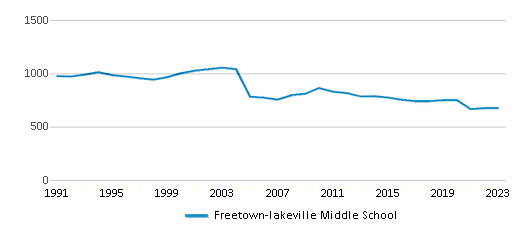
Gender %
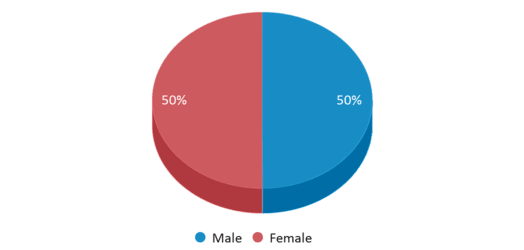
Total Classroom Teachers
53 teachers
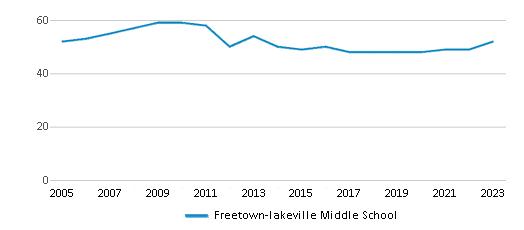
Students by Grade
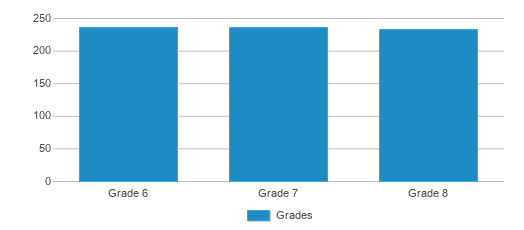
School Rankings
Freetown-lakeville Middle School ranks within the top 50% of all 1,631 schools in Massachusetts (based off of combined math and reading proficiency testing data).
The diversity score of Freetown-lakeville Middle School is 0.21, which is less than the diversity score at state average of 0.65. The school's diversity has stayed relatively flat over five school years.
Overall Testing Rank
#726 out of 1631 schools
(Top 50%)
(Top 50%)
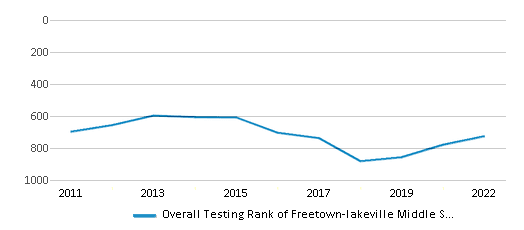
Math Test Scores (% Proficient)
49%
41%
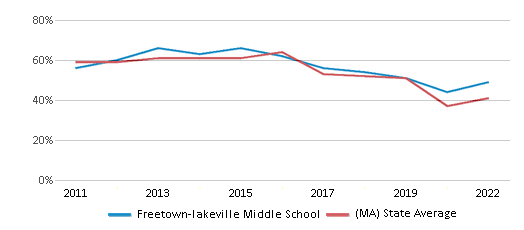
Reading/Language Arts Test Scores (% Proficient)
45%
44%
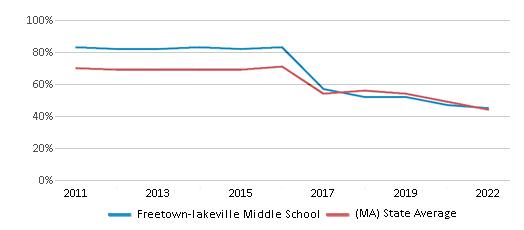
Science Test Scores (% Proficient)
58%
44%
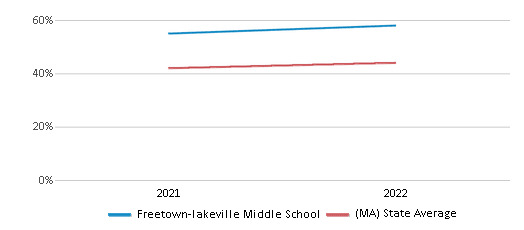
Student : Teacher Ratio
13:1
12:1
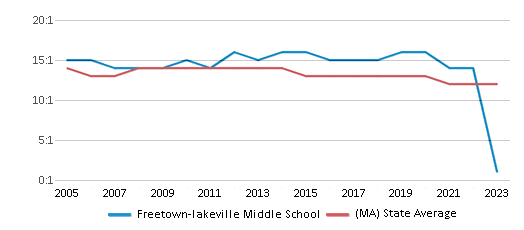
American Indian
n/a
n/a
Asian
1%
7%
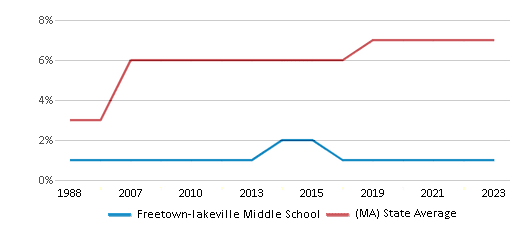
Hispanic
3%
25%
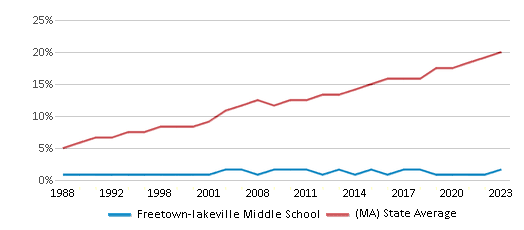
Black
4%
10%
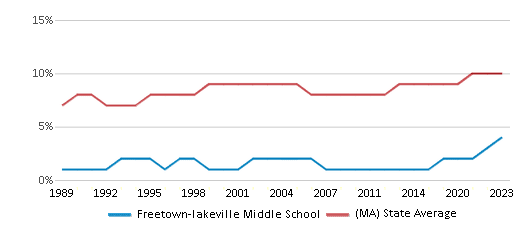
White
89%
53%
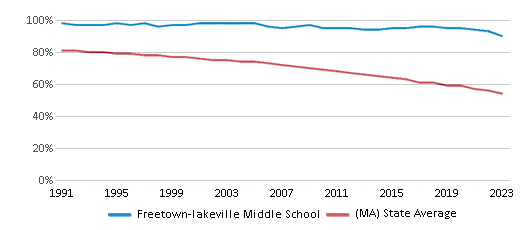
Hawaiian
n/a
n/a
Two or more races
3%
5%
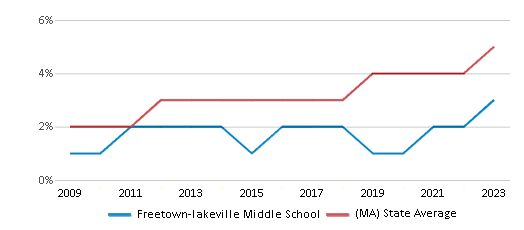
All Ethnic Groups
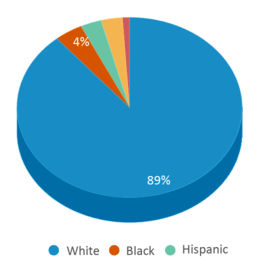
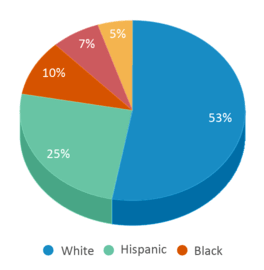
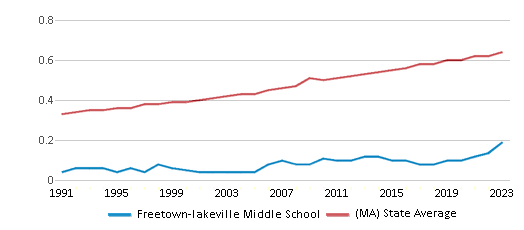
Participates in the National School Lunch Program (NSLP)
Yes
Eligible for Free Lunch
15%
35%
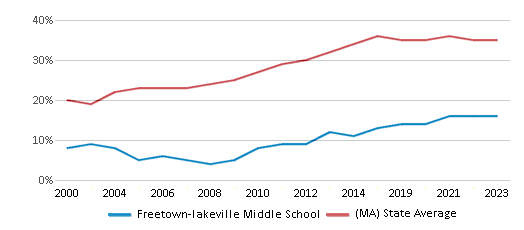
Eligible for Reduced Lunch
2%
4%
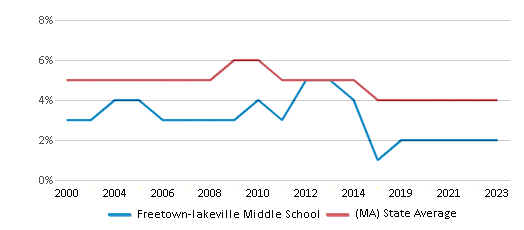
School Statewide Testing
School District Name
Source: National Center for Education Statistics (NCES), MA Dept. of Education
Profile last updated: 02/09/2025
Frequently Asked Questions
What is Freetown-lakeville Middle School's ranking?
Freetown-lakeville Middle School is ranked #726 out of 1,631 schools, which ranks it among the top 50% of public schools in Massachusetts.
What schools are Freetown-lakeville Middle School often compared to?
Freetown-lakeville Middle Schoolis often viewed alongside schools like Dartmouth Middle School by visitors of our site.
What percent of students have achieved state testing proficiency in math and reading?
49% of students have achieved math proficiency (compared to the 41% MA state average), while 45% of students have achieved reading proficiency (compared to the 44% MA state average).
How many students attend Freetown-lakeville Middle School?
705 students attend Freetown-lakeville Middle School.
What is the racial composition of the student body?
89% of Freetown-lakeville Middle School students are White, 4% of students are Black, 3% of students are Hispanic, 3% of students are Two or more races, and 1% of students are Asian.
What is the student:teacher ratio of Freetown-lakeville Middle School?
Freetown-lakeville Middle School has a student ration of 13:1, which is higher than the Massachusetts state average of 12:1.
What grades does Freetown-lakeville Middle School offer ?
Freetown-lakeville Middle School offers enrollment in grades 6-8 (offers virtual instruction).
What school district is Freetown-lakeville Middle School part of?
Freetown-lakeville Middle School is part of Freetown-Lakeville School District.
School Reviews
3 3/22/2020
My kid just came to this school in the middle of the year and he said it had been GREAT so far. The only problem is the diversity. The population is almost all white. PEOPLE THAT AREN'T WHITE MOVE TO LAKEVILLE, FREETOWN, OR ASSONET! I'M BEGGING YOU!
1 3/17/2020
I found some S H I T on the ground. The whole school is so gross.
5 7/4/2014
I love this school I came in half of the year and everyone was so kind and helpful! Everyone if respectful of eachother and it is just a great school!
2 1/14/2014
Freetown Lakeville Middle School is very organized. Great teachers and administrators.
I highly recommend sending you're children here.
The seventh grade math teachers are amazing when coming to teaching kids with a hard time.
Thank you for reading!
Review Freetown-lakeville Middle School. Reviews should be a few sentences in length. Please include any comments on:
- Quality of academic programs, teachers, and facilities
- Availability of music, art, sports and other extracurricular activities
Recent Articles

What Is A Charter School?
Explore the world of charter schools in this comprehensive guide. Learn about their history, how they operate, and the pros and cons of this educational innovation. Discover key facts about charter schools, including admission policies, demographics, and funding, as well as what to look for when considering a charter school for your child.

10 Reasons Why High School Sports Benefit Students
Discover the 10 compelling reasons why high school sports are beneficial for students. This comprehensive article explores how athletics enhance academic performance, foster personal growth, and develop crucial life skills. From improved fitness and time management to leadership development and community representation, learn why participating in high school sports can be a game-changer for students' overall success and well-being.

February 05, 2025
Understanding the U.S. Department of Education: Structure, Impact, and EvolutionWe explore how the Department of Education shapes American education, from its cabinet-level leadership to its impact on millions of students, written for general audiences seeking clarity on this vital institution.








